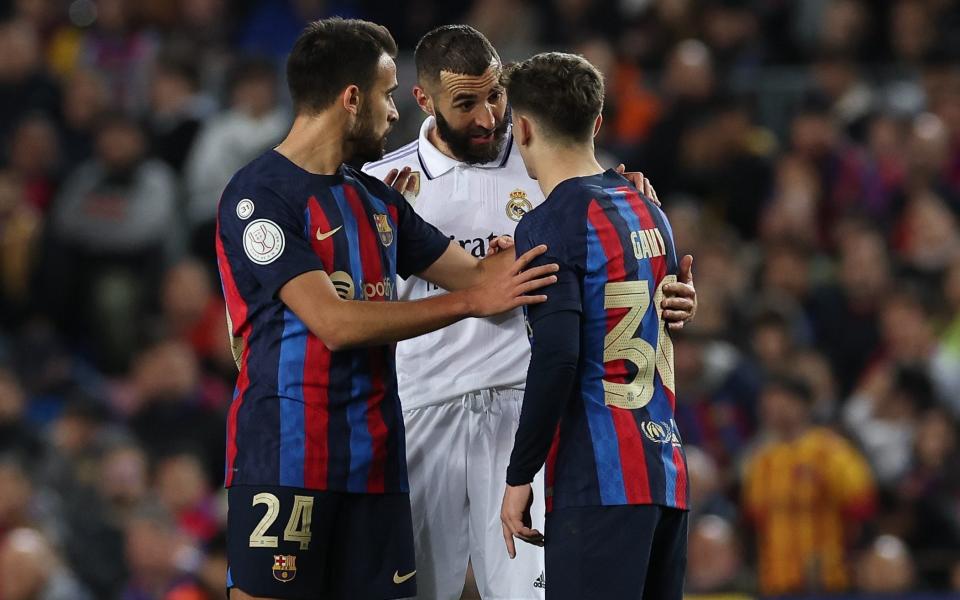Real Madrid and Barcelona embroiled in spectacular General Franco favouritism row

The two chief European Super League rebels, and Spain’s biggest clubs, have clashed anew in spectacular fashion, with Real Madrid accusing Barcelona of being the favourites of the country’s fascist dictator General Francisco Franco, who died in power in 1975.
The dispute – ignited by a video published on Real’s website this week – does, however, distract from the enormous financial and governance challenges facing the pair, with some wondering if it is a necessary distraction technique. Real and Barcelona have shared a detente in recent years that has gone beyond the field to their collective attacks on Uefa, sharing United States financiers, and the strategies of borrowing that have kept the Catalan club afloat.
The softening of what has, in the past, been a fierce rivalry that has driven the global broadcast revenue in Spain’s Liga has been viewed as potentially detrimental to the overall value of television rights. While Real have been tolerant of Barcelona’s extraordinary debt accumulation, they have been critical of its role in the scandal over payments to former referee chief Jose Maria Enriquez Negreira.
It was that saga, which threatens to see Barcelona sanctioned by Uefa, which prompted its president Joan Laporta to say recently that Real was “the club of the regime”, which historically benefited from refereeing decisions.
While he did not mention Franco by name, the reference did not require explanation. Franco ruled Spain from the nationalist victory in the civil war in 1939 until his death, presiding over hundreds of thousands of deaths during and after the conflict. Under his leadership in the Second World War, Spain was officially neutral but supported Hitler and Mussolini informally. Franco’s regime was reluctantly rehabilitated on the world stage as the west sought allies against the influence of the Soviet Union.
The video published by Real’s in-house media, a de facto voice of the club’s president Florentino Perez, asked “who is the real club of the regime?”
— Real Madrid C.F. 🇬🇧🇺🇸 (@realmadriden) April 18, 2023
It featured footage of a minister of Franco’s government attending the opening of Camp Nou in 1957. It also chronicled the club making Franco an honorary member in 1965 and emphasised the greater number of domestic trophies won by Barcelona during Franco’s rule compared to Real.
Certainly it would have been impossible under a dictatorship for Barcelona not to pay some homage to Franco. As for Real, they won the first five European Cups from 1956 onwards, and have always been seen as the team of the establishment despite strenuous denials including from Santiago Bernabeu, the president who was in charge in the Fifties. Barcelona will always point to the hijacking in 1953 by Real of their signing of Alfredo Di Stefano, who would go on to become one of Real's greatest players.
Football, and Real in particular, were regarded as one way that Spain could show a successful, modern face after the horrors of its civil war and Franco’s strong connections with the Axis powers.
Under Franco, Real were given land in Madrid, expropriated from its rightful owners, to build their Ciudad Deportiva – originally a sports club for members that became their training ground in later decades. At the turn of the 21st century that land was rezoned by local authorities and developed by the club into commercial office space, generating the wealth that enabled the club to spend heavily on some of the world’s biggest players.
Yet now Real and Barcelona, along with Juventus, are bound by their opposition to Uefa and continued support for the ESL. They have shared the same US investor, Sixth Street, and the advisors Key Capital Partners. The two clubs are also connected through A22 Sports, which acts as an advisor for the ESL.
Barcelona borrowed €700 million (£618 million) from future revenues last summer alone – a strategy already adopted by Real. Their debt is around €1.5 billion (£1.3 billion) and could double with the financing of the rebuilding of Camp Nou. Real’s debt, including its Bernabeu rebuild, is expected to exceed €1 billion (£882 million).

 Yahoo Sport
Yahoo Sport 





































